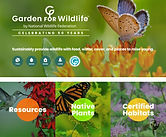Acerca de

Healthy Yard Recognition Program
West Vincent Healthy Yard Recognition Program
Healthy Yards benefit our whole community. A healthy yard will have a positive effect on:
• Air and water quality
• Stormwater management
• Biodiversity, supporting our wild pollinators, birds, amphibians, …
• Health of people and pets
• Dark skies
• Enjoyment of outdoor spaces
• Neighborhood aesthetics
This voluntary program was created by the West Vincent Environmental Advisory Council (EAC) to recognize our residents for the positive environmental steps they are already taking and to provide inspiration and helpful tips for residents who wish to have healthier yards.
A healthy yard can save us money and time, while adding to the beauty and comfort of our outdoor spaces.
A healthy yard can make a big difference in cleaning our water and air, catching rain to manage stormwater, and providing food and shelter for wildlife, birds, and pollinators.
Research shows that trees improve the physical, mental, and social health of a community.
How You Can Participate
For questions about healthy yard topics or to make a personal consultation
email us at: eac@westvincenttwp.org
We love sharing what we have learned!
Complete the Healthy Yard Recognition Application! This fun and interactive application will take five - ten minutes to complete.
There are 21 qualities we believe a healthy yard would have. We invite you to see how many apply to your yard by filling out the application.
Scores of 15 or higher qualify for:
• A metal WVT Healthy Yard Lawn Sign (or digital certificate, or both)
• A certificate presented at a Board of Supervisors meeting and signed by the Supervisors in recognition of your healthy yard status
If you feel inspired to create a healthy (or healthier yard) (and we hope you do), feel free to complete the application as many times as you like, as you take steps towards a healthy yard and to improve your score!
You will find helpful information on all the topics on this web page to help you build and expand upon your healthy yard.
Healthy Highlight - Healthy Yards Have Native Trees - July 2023
Our trees are the keystone upon which all nature depends.
Why? What do trees do?
-
Collect rainwater so roads and streams don’t flood
-
Cool air and water temperatures
-
Remove pollution from the air
-
Keep pollutants from getting to streams
-
Keep topsoil and sediment from washing away
-
Remove carbon dioxide from the air
-
Produce oxygen
-
Provide food and shelter for pollinators
-
Provide food and shelter for birds
-
Provide food and shelter for beneficial insects
-
Play a crucial role in the underground network of fungi and soil organisms, a network which stores carbon, unlocks nutrients, and creates new soil for the future
Several kinds of trees provide the highest benefit. They are “Keystone Plants,” plants that nature needs in our area to survive. The top trees are, in order – Oaks; Black cherries, plum and chokecherry; Birches; Cottonwood; Maples; Crabapple; Hickory; and Pine. Oaks support far more birds and butterflies than other species. Oak saplings are a favorite food of deer, rabbits, and voles, so be sure to protect any young oaks well so they don’t become someone’s dinner!

To increase the environmental benefit of yard trees, consider underplanting them with native shrubs, ferns, and flowers! This combination provides more food and shelter for birds, butterflies, pollinators, and even fireflies! It means less lawn to mow, and it is a great place to put fall leaves instead of in the garbage. A well-designed planting can add beauty and interest to our yards.
If you would like suggestions on ways to do this, just ask your EAC! We are happy to help! Email us at eac@westvincenttwp.org.


